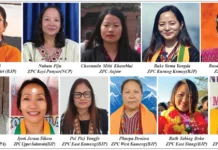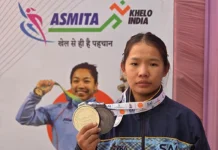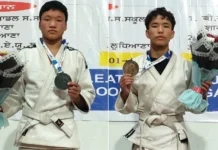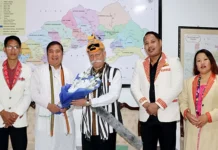GUWAHATI, 12 Aug: In an effort to highlight the untold stories of Arunachal Pradesh’ unsung heroes, the Arunachal government, as part of the Azadi Ka Amrit Mahotsav, initiated a month-long theatre festival titled ‘Arunachal Rang Mahotsav’, spanning across four Indian cities.
The first leg of the programme commenced in New Delhi on 11 July, followed by performances in Mumbai and Kolkata. The last leg of the festival, held from 8-11 August, culminated here in Assam on Friday.
The performances were held at the Srimanta Sankardeva International Auditorium. The concluding show was witnessed by, among others, Arunachal Chief Minister Pema Khandu, his Assam counterpart Himanta Biswa Sarma, and Arunachal DCM Chowna Mein.
Addressing the opening ceremony of the celebration here on 8 August, Khandu praised the efforts, led by Mein, “in unearthing the research on the unsung heroes of the state.” He said that, due to inadequate documentation, both the locals and the world have remained unaware of the significant historical events of Arunachal for a long time, “but the initiative of the government of India under the Azadi Ka Amrit Mahotsav has given an opportunity to research and document the unsung heroes.”
Sarma expressed delight over the immersive play on the opening day, featuring the Anglo-Tai Khamti war. He said that such cultural exchange programmes strengthen the bond between Assam and Arunachal.
Sarma congratulated Arunachal on making remarkable progress in preserving the state’s lost history and sharing the same with the world. “The Arunachal Rang Mahotsav here will provide a wonderful opportunity for everyone to discover the longstanding cultural heritage and traditions of the neighbouring state,” he said.
Mein in his address stated that “the enormous task of collecting and documenting the hidden history of the state in an effort towards compiling the list of unsung heroes has been quite satisfactory so far, with the continuance of research work being carried forward with the purpose of reinstating Arunachal’s historical glory.”
He thanked Nepha Wangsa, “the primary person behind the entire research project,” along with the history department of Rajiv Gandhi University for “going above and beyond in the process of collecting evidence from Assam archives, regional and national archives/museums and the British Library.”
The three plays presented over the course of four days highlighted the major resistance by the tribal people against British colonialism, namely Chowpha Plang-Lu of the Tai Khamti; Poju Mimak of the Abors (now called Adis); and ‘Ninu 80!’ of the Wancho warriors.
The final play, titled ‘Arunachal: Ek Safarnama’, depicted Arunachal’s journey from its NEFA days to the present.
These productions revealed the historical resistance of Arunachal’s tribal communities against foreign rule in an immersive theatrical performance put up by theatre artists of Arunachal, under the guidance of project director Riken Ngomle. (DCM PR Cell)





